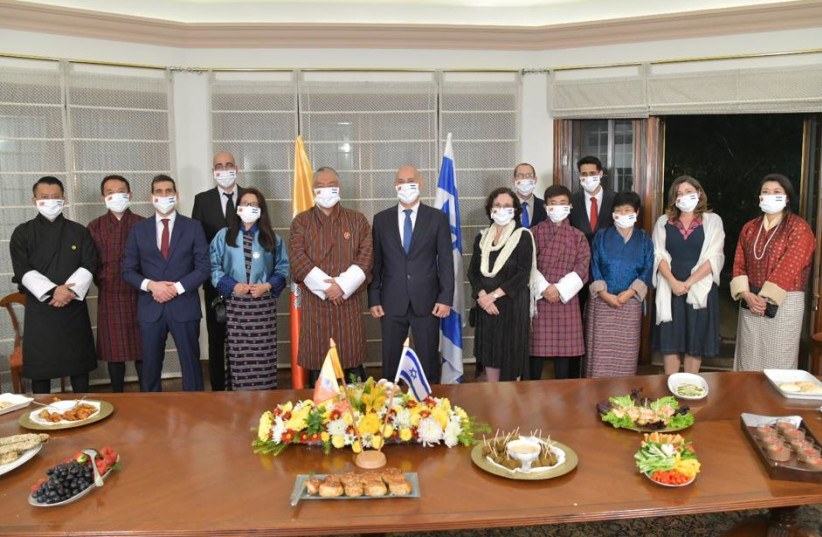“I want to thank the Kingdom of Bhutan and praise the decision to establish full diplomatic relations with Israel,” Ashkenazi said.
LAHAV HARKOV

Israel established full diplomatic relations with Bhutan for the first time on Saturday night.
Israeli Ambassador to India Ron Malka and his Bhutanese counterpart Vetsop Namgyel signed the final agreement normalizing ties on Saturday night.
The countries’ foreign ministries held secret talks over the past year towards the goal of forging official ties, which included delegations from Jerusalem to Thimphu, Bhutan’s capital, and Thimphu to Jerusalem.
The effort to make relations between Thimphu and Jerusalem was separate from the Abraham Accords, in which four Arab countries – United Arab Emirates, Bahrain, Sudan and Morocco – normalized ties with Israel in as many months, with American mediation. In fact, Bhutan does not have official diplomatic relations with the US.
Bhutan is a Buddhist kingdom in the Himalayas, bordering on India and the Tibet Autonomous Region of China, which has gone to great lengths to keep itself isolated from the rest of the world in order to avoid outside influences. Bhutan has formal diplomatic relations with only 53 other countries, a list that does not include the US, UK, France or Russia, and embassies in seven.
The country does not have ties with China, either, having closed its border to the country on its north after its 1959 invasion of Tibet.
Malka said in an exclusive interview with The Jerusalem Post that the ceremony marking official diplomatic relations between Israel and Bhutan was “exciting…modest, but very special.”
The ambassador said that in recent years, Bhutanese governments have reached out to Israel.
“They have been impressed by Israel’s abilities for many years, and their prime minister wanted relations,” he said. “We advise them on topics that are important to them like water management, agriculture and technology…education and professional training, as well. They’re very interested in the topic of medicine.”
Bhutan’s government “thinks of Israel as a leading country in technology and innovation that can help them progress and use more advanced technology and train their youth.”
Another area in which Bhutan has sought Israel’s advice is in building a national service program for its youth.
As for tourism, the country that limits the number of outsiders who can enter will now likely be more open to Israelis, Malka said, though no precise numbers have been discussed.
“They let very few people visit, even though it is very attractive, because they want to preserve its history and its nature and environment. It was very hard before, but now Israelis will be more accepted and they will want to develop [Israeli] tourism,” Malka said.
Malka has visited Bhutan twice and said that it is “a very special place that is different from anywhere else. They really preserved their culture and their natural resources. There is not even one traffic light. It is very natural.”
It is still unclear if Israel will open an embassy in Thimphu; Malka may be nonresident ambassador to Bhutan, just as he is to Sri Lanka in addition to residing in Delhi, from which Thimphu is a two-hour flight.
Foreign Minister Gabi Ashkenazi and Foreign Minister of Bhutan Tandy Dorji spoke on the phone last weekend.
“I want to thank the Kingdom of Bhutan and praise the decision to establish full diplomatic relations with Israel,” Ashkenazi said. “I invite my friend Foreign Minister Dorji to visit Israel to promote cooperation between the countries. I hope that in the next year we will host the King of Bhutan in the next year for his first official visit [to Israel].”
Ashkenazi also thanked Malka and the embassy staff for working to strengthen Israel’s ties to Bhutan and bringing them to fruition.
Prime Minister Benjamin Netanyahu praised the new relations and called it “another fruit of the peace agreements,” adding that Israel is in touch with more countries that want to establish ties with Israel.
Hundreds of Bhutanese citizens have participated in agricultural training programs through MASHAV, Israel’s development agency.
Israel briefly had a nonresident ambassador to Bhutan in 2010, Mark Sofer, who was Israel’s ambassador to Israel and Sri Lanka at the time.
In 2017, Gilad Cohen, the head of Israel’s Asia-Pacific division, became the most senior Israeli official to visit Bhutan. During his trip, he met the country’s prime minister.
Bhutan, which is about twice as large as Israel, but with only 800,000 residents, is thought to be one of the most beautiful countries in the world, but limits tourism, especially from outside South Asia, and only allowed television and the Internet in 1999, in an attempt to preserve its culture and natural resources.
It uniquely measures its quality of life by “Gross National Happiness” instead of gross domestic product (GDP), and in fact, the World Happiness Report was a joint initiative of the Bhutanese prime minister and UN secretary-general in 2011. That metric emphasizes sustainable development, environmental conservation, preservation of culture and good governance, as well as mental and physical health, among other values.
The Bhutanese are thought to be among the happiest people in the world, and the happiest in Asia, but they are also among the poorest in the world.
Its main export is hydroelectric energy, to India.
Bhutan became a constitutional monarchy, holding its first general election, in 2008. Before that, it was an absolute monarchy. Its king’s official title is Dragon King.
Content retrieved from: https://www.jpost.com/international/israel-normalizes-ties-with-bhutan-651904?fbclid=IwAR0XNnLquu6TMrVfA-SqcQd0gJPuxqF6sj-843eYa_SOVsvMbsP_3ls6C_c.